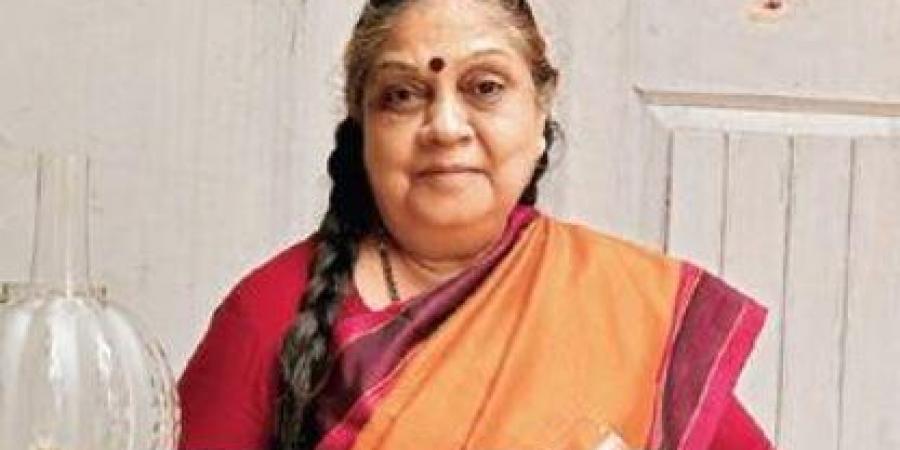Monthly Archives: December 2019
17
16
15
Making the ‘glass’ ceiling
Entrepreneur Bela Patel speaks to CE about the art of making chandeliers and her crystal clear love for it.
Bengaluru :
Entrepreneur Bela Patel, who has been handling her mother’s business of making chandeliers since 1995, tells us that the family got into this business quite by chance. Her father Jagadish Patel had come down from London to Hyderabad to get into grape cultivation. However, when the business didn’t take off as planned, he decided on helping his wife, Kundan Patel, with her venture, The Crystal Town.
The company that lights up homes with their designer chandeliers has a wide range of clientele, including the Rashrapati Bhavan, Bangalore Club, Windsor Manor, The Crystal room In Taj Mahal Palace and Hotel Oberoi in Mumbai. And very recently, they were handed charge of restoration at the Laxmi Vilas Palace in Vadodara.
Walking through the workshop in the backyard of her British-styled bungalow in Richmond Town, you come across unfinished work, each of which has a story of its own. The most fascinating story, however, is the conviction and struggles she faced when she decided to bring Crystal Town to Bengaluru in 1995. “I used to handle the Bengaluru business and got into it to help my mother. It was difficult for me to handle both home and the business, so one of my friends, Sneha Naidu, helped me in starting the business here in the city. In 1994, she suggested we organise a small exhibition at Safina Plaza,” says Patel.
That was the turning point in Patel’s life. With the exhibition hitting the sensibilities of Bengalureans, she was able to set up shop here. Her first big project was with The Bangalore Club, after which she was approached by ITC Windsor. For the last three years, she and her team have been re-doing the chandeliers, which they had originally made with glass in 1982 during the hotel’s inauguration, with new Swarovski spectra crystals. A small chandelier of around 2 -2.5 feet high start from `20,000
The initial challenge for Patel when she took over from her mother was to live up to her legacy. “When I started off, I used to take advice from my husband or anybody I trusted, especially when it came to the centre piece of the chandelier. Because that is the one would take the weight of the whole chandelier,” says Patel, adding that many dealers who worked with her mother often supplied her with defective parts initially.
Patel has a rather unconventional method of estimating the size of a chandelier. She does not look for blueprints of the building; rather she does a rough sketch of the chandelier on the floor of the building to conceive the design concept. “It’s easier to keep a track that way,” says Patel, who had seen her mother doing the same.
As time has passed, taste also has, but the 60-year-old entrepreneur says it has not dampened her business, since they keep track of the changing needs of the market.
source: http://www.newindianexpress.com / The New Indian Express / Home> Cities> Bengaluru / by Monika Monalisa / Express News Service / December 14th, 2019
13
12
Start-up to research on degenerative eye disease

A city-based medical science startup is gearing up to halt the progress of degenerative eye disease in Indians after trials in blind rats showed the creatures regaining their sight in a few months.
Age-Related Macular Degeneration (AMD) is a form of blindness that affects a segment of the adult population after they reach the age of 50. It accounts for 8.7% of all blindness worldwide. Retinitis Pigmentosa (RP), meanwhile, is a rare genetic disorder, which affects one child in 4,000.

There is no known cure for the diseases. However, Dr Jogin Desai, whose startup, Eyestem, which has been under incubation by the government’s Centre for Cellular and Molecular Platforms (C-Camp) for the past three years, believes its work can halt the progression of the diseases by using genetically modified stem cells to restore the pigment epithelium in the cornea.
The pigment epithelium, which is only 1.5 mm thick, performs critical functions that support photoreceptor health and integrity. It was likened to the ‘foundation’ of a building. The therapy will also seek to restore the photoreceptor cells in the retina, which were likened to ‘buildings’. Phase 1 human clinical trials are set to start in 12 to 15 months.
Existing research postulates that using biodegradable ‘scaffolding’ upon which modified cells are stacked can help rebuild the pigment epithelium. However, Dr Desai said that current work delivering modified Eycyte-RPE (or Retinal Pigment Epithelium) cells, which are suspended in the liquid, is even more effective.
“We have found that cells delivered in this way automatically seek out their ‘body niche’ and assimilate into the system,” he said, adding that trials in blind lab rats had showed the animals regaining their vision over a two-month period.
‘Most discoveries fail’
Desai, however, cautioned that no amount of promise can legitimise an idea if its time has not yet come. “In fact, just one of 1,600 scientific discoveries made in research labs makes it into a fully fledged development where it can impact people’s lives,” he explained.
Most scientific discoveries are weeded out in exacting, three-phased clinical trials, based on the criteria of safety, scalability and effectiveness.
source: http://www.deccanherald.com / Deccan Herald / Home> City> Life in Bengaluru / by Akhil Kadidal / DHNS, Bengaluru / December 09th, 2019
Safal Fasal: This App helps sugarcane farmers detect five diseases in crop
The idea came to fruition when Dr Omkar interacted with farmers and was told about the difficulty in identifying crop disease.

Bengaluru :
With just a click, sugarcane growers will be able to identify as many as five diseases in their crop using the app ‘Safal Fasal’.
The app is being developed by Dr SN Omkar, chief research scientist, Department of Aerospace Engineering, Indian Institute of Science (IISc), Bengaluru, who has finished programming the algorithm that identifies diseases. A database of remedial measures is also being put in place, in case a disease is detected.
The idea came to fruition when Dr Omkar interacted with farmers and was told about the difficulty in identifying crop disease.
While many farmers would be adept at assessing the health of their crops, newcomers in the sector would benefit the most from this app.
“There are young agriculturalists, who may not be acquainted with crops and diseases. This will help them immensely. Also, since a few farmers whose crops have been affected by diseases, could visually inspect their crops because of experience, there are many farmers who would benefit immensely by the democratisation of this information. This can even prevent the large scale loss of crops due to disease,” Omkar told The New Indian Express.
Experts, including those from the biotechnology sector, have helped pick five popular diseases prevalent in the region and ways to identify them with certain characteristics. This has helped in programming the apps’ algorithm that analyses pictures through image processing in the cloud. With just five pictures of the yield, one can know the state of the sugarcane. The app will provide health reports as well.
At present, the team is working on increasing the precision of identifying diseases through pictures. “We are trying to get a larger database of pictures of more healthy and unhealthy crops. Currently, the precision of the app is at 86%,” said Dr Omkar.
source: http://www.newindianexpress.com / The New Indian Express / Home> Good News / by Pearl Maria D’Souza / Express News Service / December 10th, 2019

